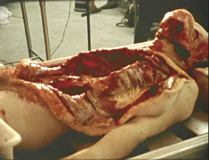The camera shots were very close up to the point where body parts were no longer recognizable. I think I appreciated that. A bird’s eye view of a dead body and the autopsy process would probably have been overwhelming. However, even in the format it was shot in the film caused me to question ideas of humanity and of aliveness.
Ethically I’m wondering if this should be filmed? What was the purpose of the filmmaker in making this film other than fulfilling curiosities about death? Our television networks have created now formulaic shows that investigate the death of a person, including graphic scenes that fed that same curiosity (but in a fictional format).
Humanity and respect for the dead in particular are questioned when we allow our filmmakers, entertainers and artists to go to far. But do we have the right to make them stop? At points I felt the bodies were there to be put on display, similar to what the title suggests (The Act of Seeing). It felt too meat market for me. My own humanity and the humanity of my family and friends who will all die made me very uncomfortable with the concept of viewing them through a gaze of anything other than respect and love. Especially poignant is the shot where the coroner rips the face off the body, symbolically removing their identity and their history. Similarly with the removing of the body’s brain: that was $40,000- plus of university; over 16
 years of school; memories and thoughts all removed from a person’s skull. In death we are almost treated like animals at the butcher. They take our most valuable parts in life and dispose of the rest of us (either in the ground or in a metal case in a wall).
years of school; memories and thoughts all removed from a person’s skull. In death we are almost treated like animals at the butcher. They take our most valuable parts in life and dispose of the rest of us (either in the ground or in a metal case in a wall).When a person close to me died recently, I couldn’t help but to think how he was treated when he was in the coroners. Did they take away his identity? Does he deserve an identity now that he's dead? What will happen to me when I die?
I guess my irrational feelings about life and death have taken over, but the film allows us that space. It gives us a way of seeing and thinking that we would otherwise push to the side and not consider (until we are closer to death).
I think a quote from the article, “Seeing with Experimental Eyes” by Bart Testa best sums up what Brakhage was trying to convey, “We witness what exceeds our sight and grasp. The camera gazes. It presents evidence destined to disturb. The evidence cries out for argument, some interpretative frame within which to comprehend it. Nowhere is this need more acutely felt than in a film that refuses to provide any explanatory commentary whatsoever” (270).

No comments:
Post a Comment